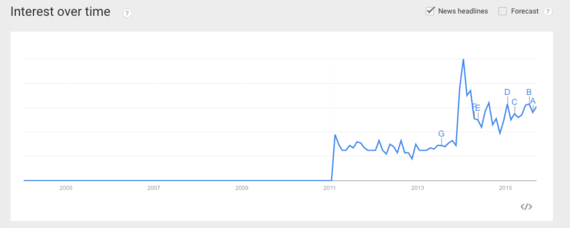In 2006, a man named Bill Peters defined the word "side hustle" on UrbanDictionary.com: "A sideline that brings in cash; something other than your main job. Maybe playing weekend gigs or life coaching."
In that same year, Google Trends registered exactly 0 searches for the term and it remained that way through 2011. Since then, the number of searches has grown by 6,000% and the definition has broadened to encapsulate a lot more than just weekend gigs and life coaching.
Over the past two years, our team at Purpose Generation has had hundreds of conversations with peers about what makes them tick and how they spend their time. Given that we spend the majority of our waking hours dedicated to working, our career is inherently a big part of these conversations. In fact, one of the patterns that originally motivated us to start our company was seeing our friends leave their comfortable, 6-figure jobs at banks, consulting firms, and Fortune 500's, in favor of higher risk, lower-paying opportunities at startups.
The promise of increased flexibility and purpose are two of the main drivers behind this exodus from Corporate America. With almost 60% of Millennials willing to take a 15% pay cut to work for a company whose values align with their own; 45% of Millennials choosing workplace flexibility over pay; and 78% of Millennials reporting that enjoying their work is more important than their salary, companies can no longer afford to ignore what Fast Company and Forbes are referring to as "The Future of Work".
This is not to say prior generations weren't just as passionate or engaged. Of course they were. The difference is that Corporate America simply wasn't set up to support them, prioritizing face-time and hierarchy over productivity and output.
Shifting priorities among younger employees has led to an uptick in the number of people pursuing "portfolio careers", a term that was first coined by Irish author and organizational management specialist, Charles Handy. Handy predicted that individuals would increasingly leverage their unique portfolios of skills, abilities, and achievements to gain temporary employment opportunities in a variety of organizations simultaneously. It turns out, Handy was quite the visionary. According to a recent report on Freelancing in America, 34% of the U.S. workforce is currently considered contingent, temporary, diversified or freelance and this number is expected to grow to 40% by 2020.
However, while freelancing is becoming increasingly accepted as a worthwhile career path, there is still a certain stigma attached to these alternative types of employment. As a result, people juggling multiple jobs may only share part of the truth when asked what they do, out of discomfort or embarrassment, when instead they should be lauded for it.
There are a variety of explanations for this tension, but one easily-addressable one is the fact that there is still no solid definition for these types of sideline activities. The Freelancing in America report introduces new definitions for the type of worker, such as "moonlighter" -- a full time employee who also does additional freelance work on the side - but the report makes no mention of the type of work itself.
What do you call your lifestyle blog that takes up 20+ hours a week, brings in a few thousand dollars a month in sponsorship revenue, and helps you cultivate your creativity? Or your gig as a part-time stylist to support yourself while getting a degree in fashion merchandising? This is unchartered territory. It's not necessarily your "job", but it's not merely a passion project either.
We believe the future of work requires a new vocabulary.
It is time to revive and refresh Bill Peters' 2006 definition of the "side hustle" to better describe the phenomenon it has come to represent:
"A "side hustler" is a passionate, hard-working individual who is dedicated to a sideline that provides him or her with something valuable and tangible in return, such as cash, skills, or exposure."
If you are considering adopting a side hustle, we highly recommend you start by clarifying your primary motivation: Are you looking to pursue a life-long passion more seriously, are you looking for opportunities to earn some extra money, or are you searching for exposure to new networks and environments?
There are plenty of resources and opportunities out there to help you find and launch a side hustle, but it's important to make sure you invest your time wisely and find an activity that will be most rewarding to you.
This article first appeared on Purpose Generation's blog.

